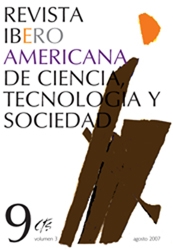Innovation, Technology, and Social Practices in Cities
Towards Living Labs
DOI:
https://doi.org/10.52712/issn.1850-0013-935Keywords:
innovation, living labs, ICT, co-creationAbstract
How do metropolitan areas interact with innovation processes and knowledge management? How can technological innovations be experienced with the active participation of users? This work connects the process of co-construction of sociotechnical innovations with the experiencies retrieved in urban living labs. The first part of this work analyses the concepts of technological innovation related to the user and mantains that a certain technology’s producers and propagators are not the ones who inevitably get to know and decide its final uses: the users actually develop new uses and decide which uses will finally prevail. Technological innovation based on knowledge, transformed into services and goods by the intensive use of information and communications technologies (ICT), concentrates in metropolitan areas. In this work it is suggested that these areas’ development requires procedures of co-creation of technological and social innovations.
Downloads
References
ANNERSTEDT, J. y HASELMAYER, S. (2006): “Third Generation Living Labs: The Quest for User-Centered Mobile Services”, eChallenges 2006, Barcelona, 26 de octubre de 2006.
AROCENA, R. y SUTZ, J. (2002): “La Universidad Latinoamericana del Futuro. Tendencias - Escenarios - Alternativas”, Revista de la OEI. Disponible en: http://www.campus-oei.org/salactsi/sutzarocena04.htm.
AROCENA, R. y SUTZ, J. (2001): “La transformación de la universidad latinoamericana mirada desde una perspectiva CTS”, en López Cerezo y Sánchez Ron (eds.), Ciencia, Tecnología, Sociedad y Cultura, Madrid, Biblioteca Nueva-OEI.
BAÑEGIL PALACIOS, T. M. y SANGUINO GALVÁN, R. (2003): “Gestión del Conocimiento y estrategia”, Madri+d, nº 19. Disponible en: http://www.madrimasd.org/revista/revista19/tribuna/tribuna3.asp.
BERGONZELLI, P. y COLOMBO, C. (2006): La Sociedad de la Información y el Conocimiento: implicancias para América Latina, en Contribuciones a la Economía. Disponible en: http://www.eumed.net/ce/2006/pbsc.htm.
BOISIER, S. (2001): Desarrollo (local): ¿De qué estamos hablando?. Disponible en: http://www.cedet.edu.ar/sitio/agenda/boisier.pdf.
BOTHEL, R. (2001): Bringing It All Together. Disponible en: http://www.westga.edu/~distance/ojdla/spring41/bothel41.html.
COMMISSION OF THE EUROPEAN COMMUNITIES, (2003): The role of the Universities in the Europe of Knowledge. Disponible en: http://europa.eu.int/eurlex/en/com/cnc/2003/com2003_0058en01.pdf.
COMISIÓN EUROPEA (1998): La información del sector público: Un recurso clave para Europa. Libro Verde sobre la información del sector público en la Sociedad de la Información. Disponible en: ftp://ftp.cordis.lu/pub/econtent/docs/gp_es.pdf.
COHENDET, P., CREPLET, F. y DUPOUËT, O. (2001): CoPs and Epistemic Communities: A Renewed Approach of Organisational Learning within the Firm. Disponible en: http://www-eco.enstbretagne.fr/Etudes_projets/RNTL/workshop1/dupouet.pdf.
FINQUELIEVICH, S. (2005): TIC y desarrollo local. Municipios e Internet, Buenos Aires, La Crujía.
FINQUELIEVICH, S. y PRINCE, A. (2006): Las Universidades Argentinas en la Sociedad del Conocimiento, Buenos Aires, Telefónica.
FINQUELIEVICH, S. y FINQUELIEVICH, D. (2005): “Puertas alternativas a la Sociedad de la Información: Accesos no gubernamentales para las poblaciones de bajos recursos o remotas”, Ángulos emergentes en Internet, RIADEL. Disponible en: http://www.riadel.org.
GURSTEIN, M. (2003). “Effective use, local innovation and participatory design”, First Monday, vol. 8, nº 12. Disponible en: http://www.firstmonday.org/issues/issue8_12/gurstein/index.html
KAUFMAN, E. (2005): “Building the Basis for the Back Office through Communities of Practice”, en Gascó-Hernández, M., Latin America Online: Cases, Successes and Pitfalls, Barcelona, International Institute on Governance of Catalonia e Idea Group (EE.UU.).
KAUFMAN, E. y GURMENDI, M. L. (2006): “Comunidades y redes en la innovación: software y back office. El caso de los comités del SIU en la Argentina”, en Borello, J., Robert, V. y Yoguel, G. (eds.), La informática en la Argentina: Desafíos a la especialización y a la competitividad, Buenos Aires, Universidad Nacional General Sarmiento (UNGS) y Prometeo.
LASTRES, H. M. M., CASSIOLATO, J. E., ARROIO, A. (2004): Conocimiento, sistemas de inovação e desenvolvimento, Río de Janeiro, Editora da UFRJ y Contraponto.
NONAKA, I. y TAKEUCHI, H. (1995): The Knowledge-Creating Company: How the Japanese Companies Create the Dynamic of Innovation, New York, Oxford University Press.
ONDATEGUI, J. C. (2006): “Distritos, tecnópolis y regiones del conocimiento en Japón: cambios organizativos en las áreas metropolitanas”, MI+D, nº 34. Disponible en: http://www.madrimasd.org/revista/revista34/aula/aula2.asp.
SNYDER, W. M. y WENGER, E. (2003): Communities of practice in government, the case for sponsorship. Report to the CIO Council of the US Federal Government. Disponible En http://www.ewenger.com/pub/pubusfedciodownload.htm.
THE HELSINKI MANIFESTO (2006): ‘We have to move fast, before it is too late.’ Conference Networked Business and Government: Something Real for the Lisbon Strategy, Helsinki.
TUOMI, I. (1999): “Organizing for strategic knowledge creation”, en Corporate Knowledge: Theory and Practice of Intelligent organizations. Disponible en: http://www.jrc.es/~tuomiil/articles/OrganizingForStrategicKnowledgeCreationCh14.pdf.
UNIÓN EUROPEA (2006): 1st Conference on Collaborative Working Environments for Business and Industry. Disponible en: https://www.cweeurope.org/main.php/CWE06_Report_Final_eBook.pdf?fileitem=8733573.
VALENTI LÓPEZ, P. (2002): “La Sociedad de la Información en América Latina y el Caribe: TICs y un nuevo Marco Institucional”, Revista Iberoamericana de Ciencia, Tecnología, Sociedad e Innovación, nº 2. Disponible en: http://www.campusoei.org/revistactsi/numero2/valenti.htm.
Downloads
Published
How to Cite
Issue
Section
License
Copyright (c) 2025 CC Attribution 4.0

This work is licensed under a Creative Commons Attribution 4.0 International License.
All CTS's issues and academic articles are under a CC-BY license.
Since 2007, CTS has provided open and free access to all its contents, including the complete archive of its quarterly edition and the different products presented in its electronic platform. This decision is based on the belief that offering free access to published materials helps to build a greater and better exchange of knowledge.
In turn, for the quarterly edition, CTS allows institutional and thematic repositories, as well as personal web pages, to self-archive articles in their post-print or editorial version, immediately after the publication of the final version of each issue and under the condition that a link to the original source will be incorporated into the self-archive.











